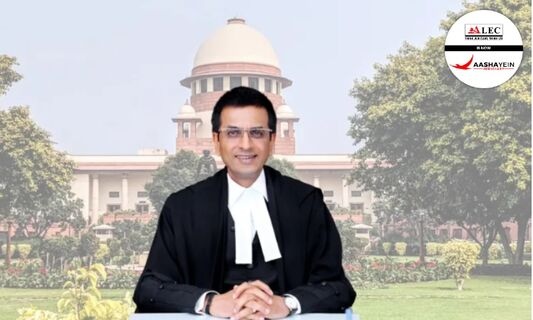Justice D Y Chandrachud ended his tenure as the 50th Chief Justice of India on Friday, after two years filled with impactful rulings and significant reforms, leaving a distinct mark in the history of the Indian judiciary. Famously known as DYC among Supreme Court advocates, Friday was his last day in court, closing out a long career as a lawyer, Supreme Court judge, and Chief Justice. Although he officially retires on Sunday, Justice Chandrachud, known for his eloquence, authored over 500 judgments—some met with criticism, but many widely appreciated.
Justice D Y Chandrachud was appointed as a judge of the Supreme Court on May 13, 2016. Before that, he served as Chief Justice of the Allahabad High Court from October 31, 2013, until his Supreme Court appointment. He was also a judge at the Bombay High Court from March 29, 2000, until becoming Chief Justice of the Allahabad High Court. Appointed as the Chief Justice of India on November 9, 2022, Justice Chandrachud's tenure is known for significant judgments on equality, fundamental rights, gender equality, privacy rights, accessibility, and inclusivity.
Some of the most famous verdicts of D.Y Chandrachud are-
- Right to privacy as a Fundamental Right
On August 24, 2017, a nine-judge bench of the Supreme Court unanimously declared that privacy is a fundamental right essential to an individual's dignity and autonomy. This decision originated from a 2012 petition by retired judge K.S. Puttaswamy, who questioned the constitutional validity of the Aadhaar Act, which established India’s Unique Identity Number program. Writing the majority opinion, Justice Chandrachud stated that privacy is an “intrinsic part of the right to life and personal liberty under Article 21” and is included in the freedoms protected under Part III of the Constitution.
- Judgement decriminalizing Homosexuality
In the 2018 case of Navtej Singh Johar v. Union of India, a five-judge bench unanimously struck down Section 377 of the Indian Penal Code, decriminalizing same-sex relations between consenting adults. Justice Chandrachud, referencing the Puttaswamy judgment, highlighted that denying the right to sexual orientation infringes on privacy. He stated that “Human sexuality cannot be reduced to a binary formulation and decriminalizing Section 377 is but a first step.”
- Sabarimala Controversy
In the case of “Indian Young Lawyers’ Association v. State of Kerala”, Justice Chandrachud was also a member of a five-judge Constitution Bench that ruled by a 4:1 majority that women in Kerala, regardless of age, have the right to access the Sabarimala temple. As it infringed upon women's fundamental rights to equality and religious freedom, the Supreme Court declared that the temple's prohibition on women entering was unconstitutional.
- Decriminalising Adultery
On September 27, 2018, in “Joseph Shine v. Union of India”, a five-judge bench led by Chief Justice Dipak Misra unanimously struck down Section 497 of the Indian Penal Code, 1860, which criminalized adultery. This law held only men accountable for having sexual relations with another man’s wife. The bench found it violated Articles 14, 15, and 21 of the Constitution, calling it outdated and discriminatory, undermining women's autonomy and dignity. While Justice Misra wrote the main opinion, Justice D.Y. Chandrachud, in his separate opinion, noted that “the law in adultery is a codified rule of patriarchy” and reinforced the outdated notion of women's subordination in marriage.
- Ayodhya land dispute
In the 2019 case “M Siddiq v Mahant Suresh Das”, a five-judge bench led by then Chief Justice Ranjan Gogoi ruled in favor of Shri Ram Virajman, granting the disputed Ayodhya site to the deity. The Sunni Waqf Board was given an alternate plot in Ayodhya for building a mosque. The bench recognized the demolition of the Babri Masjid as unlawful but concluded that the evidence supporting the Hindu claim to the site was stronger. The Court stated, “The evidence in respect of the possessory claim of the Hindus to the composite whole of the disputed property stands on a better footing than the evidence adduced by the Muslims.”
You can also read the latest judgment by visiting [Latest Judgment]
For more information, visit [Aashayein Enquiry Section]
- Banning of Triple Talaq
In 2019, a significant move to protect the rights of Muslim women was made when a bench, including Justice Chandrachud, ruled that the practice of instant triple talaq (talaq-e-biddat) was unconstitutional.
- Same-sex marriage
In “Supriya Chakraborty v Union of India” (2023), a five-judge bench led by Chief Justice D Y Chandrachud denied the request to legalize same-sex marriages and grant adoption rights to queer couples, marking a setback for equal rights for sexual minorities. The Supreme Court ruled that sexual minorities do not have a fundamental right to marriage but allowed transgender individuals in heterosexual relationships to marry. The bench also found that the Special Marriage Act (SMA), 1954, is not discriminatory for not including non-heterosexual couples.
- Challenge to abrogation of Article 370
In the case concerning Article 370, on December 11, 2023, the Supreme Court upheld the Union government's decision to revoke Article 370, which had granted special status to Jammu and Kashmir. Chief Justice Chandrachud wrote the majority opinion, with Justices Kaul and Khanna agreeing in their separate opinions. The judges unanimously recognized that Article 370 was a temporary provision meant to address the immediate needs of the former state. CJI Chandrachud held that J&K was always an integral part of India and that the special status it enjoyed was simply a type of asymmetric federalism—not an indication that it enjoyed a separate sovereignty. The Bench also gave a wide reading of the President’s Rule under Article 356, stating that the President has unilateral power under Article 370(3) to abrogate Article 370 (since the J&K Constituent Assembly stood dissolved in 1957).

